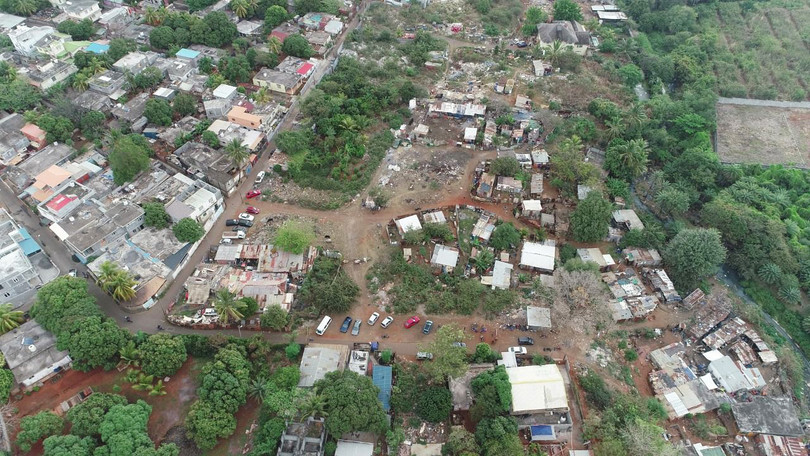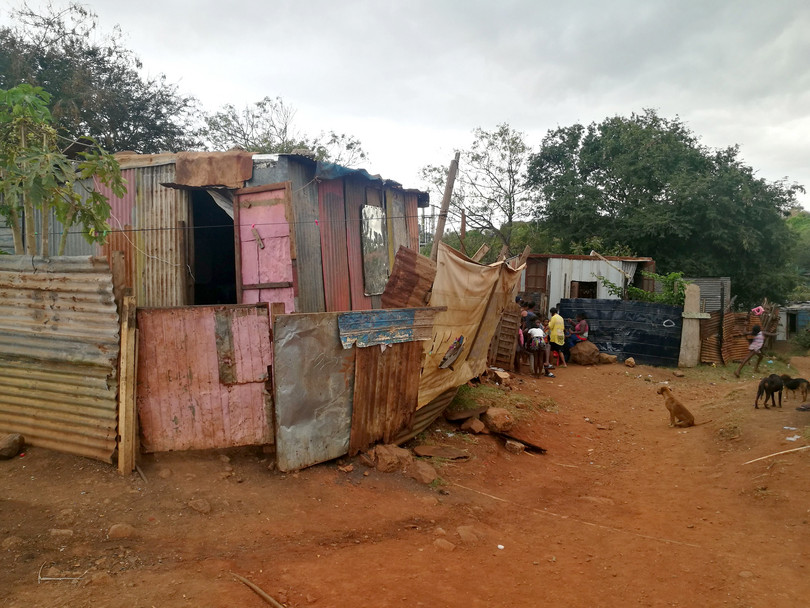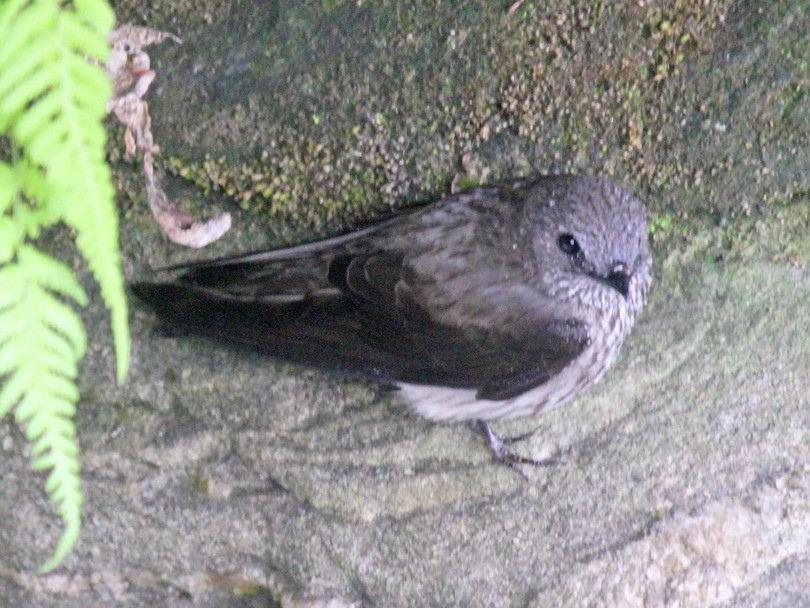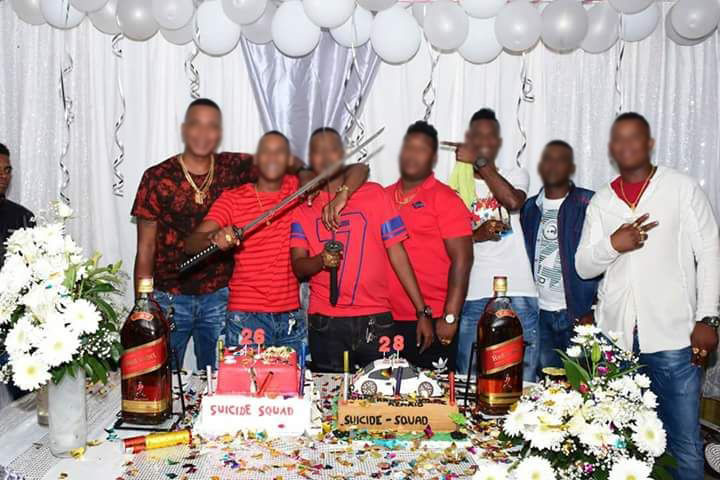Parc Coson: What dynamics in the drug-dealing capital of Mauritius tell us about networks, protection structures and the challenges to responses.

A queue to buy drugs at a key distribution point in Parc Coson, a drug-selling hotspot in Port Louis, Mauritius, October 2018. Although sheds identified as key distribution points have been destroyed since, sales have merely shifted elsewhere in the area, which remains the centre of the island’s drug economy.
Photo: Vel Moonien

Parc Coson is a key drug selling spot in Mauritius, and many PWUD travel to the area to buy drugs.
Photo: Vel Moonien

Mascarene martins are a species common to Mauritius. A ‘martin’ is also a term used in Mauritius to mean a lookout working for a drug dealer.
Photos: Dick Daniels via Wikipedia
On 10 March 2021, Mauritius entered its second lockdown to counter the spread of COVID‑19 and all non-essential businesses closed. Yet in the area known as Parc Coson (Creole for ‘pig park’), a slum in the Roche Bois suburb of Port Louis and the drug-selling capital of the island, it was business as usual. Similar trends were seen in March 2020, when the drugs market boomed throughout lockdown. While vegetable prices soared owing to scarcity, heroin prices remained steady as supply appeared unaffected.1
Both PWUD and academics at the University of Mauritius point to the resilience of the drugs market during COVID‑19 and the lack of lockdown enforcement in Parc Coson as further evidence of corruption, which is the single greatest structural enabler of the island’s longstanding drugs market.2
The drugs market is by far the largest illicit economy in Mauritius. The country has long suffered from extremely high opiate consumption and falls only slightly behind the neighbouring Seychelles, which is afflicted by the highest opiate consumption rate in the world. Reports from the National Drug Observatory since 2016 point to a sustained increase in overall drug use year on year.3 Stakeholders interviewed during 2020 and early 2021 corroborated this, and pointed to an acceleration particularly in heroin use in 2020.4
Scrutinizing dynamics in Parc Coson during the two COVID‑19 lockdowns in Mauritius provides insight into the evolving nature of the networks profiting from the trade, the protection structures underpinning the island’s drugs market, and the challenges undermining current government responses.
Dealing dynamics in the Mauritian drugs capital
Many PWUD travel to Parc Coson, near the port area of the capital, to buy drugs, making it the most profitable drug-selling spot on the island. Ali, who lives in Plaine Verte, a suburb close to Roche Bois, buys his doses of psychotropic pills and synthetic cannabinoids in Parc Coson. ‘Drugs are available since early morning till late at night. Even during this second lockdown … you can have your dose. Even the watchers are still on the lookout at Parc Coson’.5 Ali concluded that local police patrols are busy elsewhere enforcing lockdown.
Lookouts, known as ‘martins’ after a small bird common to Mauritius, are typically paid in drugs or between 1 000 and 1 300 rupees per day (US$25–37); this amount is similar to the daily wage of a skilled manual labourer such as a stonemason.6 Access to Parc Coson is tightly controlled, and the lookouts will shout crapaud! (‘toad’ in Creole and French) to warn of approaching police.7 Casual observers looking to enter the area report being told that access is blocked by construction work, and purposefully steered away.
‘The drug peddlers prey on deprived areas to run their business,’ said Marie, a social worker in Parc Coson.8 Most residents of Parc Coson live in shacks with corrugated tin roofs propped up by eucalyptus poles, in stark contrast with the rapid development seen elsewhere on the island.
Parc Coson was ‘drug and crime free long ago … a kind of haven for the needy, who could not afford a house,’ says Marie. Now ‘there is some kind of stigmatization in the Mauritian society with regard to people living near this hotspot. No taxi will venture in this area at night, even if it’s an emergency.’
Many Parc Coson residents are Rodriguans, who have emigrated from the nearby island in search of work and represent some of the poorest demographics in Mauritius. Rodriguans are particularly vulnerable to recruitment by drug networks and are prevalent among the lower echelons of networks in Parc Coson, finding employment as low-level dealers, ‘go fasts’ (who deliver drugs and transport money) or lookouts.9
The profitability of the Parc Coson’s drugs trade has attracted many networks and dealers. However, growing demand keeps competition between networks in check, and players purportedly act like a cooperative, pooling finances to import drugs in bulk, with each then taking their share once the stock arrives on the island.
Four key players are under surveillance in Parc Coson: one individual entrepreneur, Hansley Selvanaden Moothoosamy, and three networks, namely Demolition, Suicide Squad (believed to operate as a subunit of Demolition) and Lekip Prelart (‘Tarpauline Team’).10 Moothoosamy is more commonly known as ‘Gros Quart’, after the generous ‘quarter gram’ of heroin he purportedly sells.

Members of the network known as the ‘Suicide Squad’, celebrating with bottles of Johnnie Walker Red Label. This brand of whisky, together with the heavy golden jewellery sported by some members, are typical trappings of the flashy lifestyles of the ‘new generation’ of dealers in Mauritius.
Photo: Social media
One of the most long-standing and powerful networks in the Mauritian drug trade, Demolition, has been operating for over a decade. The founders originally specialized in heroin trafficking, but later diversified their operations to include a broader range of drugs, such as synthetic cannabinoids. The founders, two cousins, operate discretely, making efforts to avoid the flashy trappings of wealth.
In contrast, Gros Quart, Suicide Squad and Tarpauline Team typify a new generation of dealers, who sport flashy lifestyles evidenced by heavy gold jewellery, gold teeth, luxury SUVs and expensive liquor (Johnnie Walker Red Label whisky is a particular favourite).11 Stories of dealers flaunting their wealth abound: one Parc Coson dealer reportedly used two bottles of champagne (each costing approximately 10 000 rupees) to clean the windscreen of his Porsche Cayenne and to bathe his flip-flopped feet.12
The Anti-Drugs and Smuggling Unit (ADSU) arrested Gros Quart on 27 February 2021, being in possession of over 1 million rupees in cash, gold jewellery and 2.4 grams of cannabis.13 Charged with money laundering, Gros Quart remains in jail pending full trial. The use of money laundering charges against Gros Quart is in line with a broader strategy leveraged by ADSU and the Independent Commission Against Corruption (ICAC) to prosecute suspected mid- and higher-level dealers, who are often difficult to catch with large amounts of drugs.
Corruption in Parc Coson
Although Parc Coson has been a key drug distribution point for over a decade, its notoriety surged in 2018 following a media report showing a queue of over 50 people lining up at a shed in the area to buy drugs (see the photograph on page 19).14
This triggered ADSU to bulldoze the shed and Aadil Ameer Meea, opposition MP of Port Louis Maritime and Port Louis East’s constituency, to repeatedly raise the issue of drug trafficking in Parc Coson in Parliament.15
‘The situation hasn’t change since 2018,’ stated Meea, interviewed in February 2021. ‘Why can’t the police arrest the drug peddlers? Is there collusion between them and the local ADSU team? … Is there a lack of will to stop them?’16 Meea’s questions were repeatedly echoed by stakeholders interviewed in Parc Coson and elsewhere in Mauritius.
Marie suggested that ‘some officers [in Parc Coson] are doing their job. You can’t blame all the police force for one rotten apple.’17 However, PWUD, prison officials and lawyers interviewed in 2020 and early 2021 were consistent in their observations that corruption is widespread within the ADSU, with one ICAC official dubbing the unit ‘rotten’ owing to corruption.18
Corruption is particularly acute in units tasked with patrolling highly profitable drugs hotspots; two members of the ADSU unit patrolling Parc Coson, including a senior officer, are currently under investigation by ICAC for allegedly conspiring to transport drugs in police vehicles.19
The Constitutional Commission of Inquiry found corruption to be endemic across Mauritius’ criminal justice infrastructure, and recommended disbandment of the ADSU in 2018.20 Like the vast majority of the 460 recommendations made by the commission, this recommendation has not yet been implemented, engendering widespread frustration at a perceived stagnation in the government’s response to the drugs market.21 Many commentators point to high-level protection of the drugs market, not only in law enforcement but also across other state institutions, as the most significant obstacle to an effective response.
State response to the drugs market
The government’s response to the drugs market is heavily premised on interdiction,22 as reflected in ADSU arrest figures increasing from 1 767 in 2015 to almost 3 400 in 2020 for drug-related offences.23 However, despite the increase in arrests there has been an ‘upsurge in drug trafficking’ since 2015.24 Stakeholders interviewed for this research emphasized that arrests have little impact and that the response is increasingly falling behind.25
Figure 5 ADSU arrest data from 2000 to 2020, disaggregated by arrests for possession and arrests for dealing.
Source: ADSU
Meea suggested one reason for the limited impact of growing arrests: ‘We only see PWUD being arrested for possession of drugs.’26 PWUD similarly argue that the focus of ADSU is on arresting PWUD, not higher-level dealers.27
These observations are supported by ADSU arrest statistics in Roche Bois, the suburb encompassing Parc Coson: the vast majority of arrests are for possession of heroin, and only 16% for dealing.28 However, despite ADSU arrest statistics across Mauritius evidencing greater rates of arrests for possession, they also reflect a sizeable and growing proportion of arrests for dealing: 38% of arrests in 2019 and 47% in 2020.29 ADSU officials state that, particularly since 2019, the unit has been focused on arresting dealers, in part as a strategy to dissuade the youth from entering the drugs market.30
A move away from arrests on possession charges, which typically involve PWUD, is to be lauded. However, approaches centred on interdiction are doomed to fail, particularly in the context of Mauritius’ drugs markets, which have been highly fragmented since 2015.
The explosion of trade in synthetic cannabinoids since 2015 has fundamentally transformed the structure of the drugs market, which was originally built around profits from heroin trafficking.31 While heroin trafficking requires connections with overseas suppliers, synthetic cannabinoids and their precursors can be purchased online and imported by mail order, lowering dealers’ barrier to entry. This prompted ‘a democratization of the [drugs] trade’32 and a spike of new entrants, attracted by the lucrative profits.
A growing number of PWUD and small-scale dealers became ti patron (Creole for ‘small kingpins’) and formed independent but interconnected networks that grew in parallel to existing networks, expanding the drugs marketplace.33 In the words of one ADSU official: ‘Everyone can be a kingpin today.’ This undermines the impact of ADSU arrests, as one ‘kingpin’ is quickly replaced by another.34
Conclusion
Despite COVID‑19 lockdowns and border closures, Mauritius’ drugs market is booming. The dramatic expansion of the drugs marketplace since 2015 materially increased the scale of drugs profits, and shaped the island’s emerging ‘gang culture’.
The government’s response to the drugs market is undermined by endemic corruption, which weakens law enforcement and is reported to penetrate the higher echelons of the state. In addition, the continued focus on interdiction as a core pillar of the state’s response appears to yield few results, similar to the scant success of such strategies elsewhere. A strategy focused on arrests, typically of low- or mid-level players, is flawed. At best arrests have little impact; at worst they do significant harm to PWUD, drawing them into the criminal justice system and minimizing opportunities for licit employment in future.
A pivot in approach and greater recognition of corruption within state infrastructure are required. ADSU’s shift away from arrests for possession should be accelerated and arrests of PWUD avoided. Interventions in the drugs market should seek to offer alternative employment opportunities to vulnerable and marginalized segments of society, who, like the Rodriguan population, are often at heightened risk of recruitment as consumers and dealers. Such interventions are urgently required given the impacts of COVID‑19 on tourism, a key pillar of the island’s economy and a prominent source of employment.
Further, greater resources should be directed to ICAC, not only to bolster follow-the-money approaches but also to encourage investigations into mid- and high-level corruption within state institutions, which underpins the flourishing drugs market.
Notes
-
Telephonic interview with a former drug dealer, Rose-Hill, July 2020; interviews with PWUD across Mauritius between May and September 2020, and in February 2021. ↩
-
Interviews with PWUD across Mauritius between May and September 2020, and in February 2021; interview with academics at the University of Mauritius, January 2021, by phone. ↩
-
Republic of Mauritius, Ministry of Health and Quality of Life, National Drug Observatory Report, March 2018, https://health.govmu.org/Documents/Main Page/New/NDO_MOH_FINAL_JOSE_VERSION_05July_2018_Brown.pdf. ↩
-
Interview with former senior police officer, Mauritius, June 2020; interview with rehabilitation worker, Mauritius, June 2020; interviews with PWUD across Mauritius between May and September 2020, and in February 2021. ↩
-
Interview on 7 February 2021, Plaine Verte. ↩
-
Interview with PWUD, Upper Plaines Wilhems, June 2020. ↩
-
Interviews with PWUD, Port Louis, 13 June 2020. ↩
-
Interview 14 March 2021, by phone. ↩
-
Interview with Marie, 14 March 2021, by phone; interview with an investigator at the Independent Commission Against Corruption (ICAC), 4 July 2020; interview with senior prison official, 23 May 2020; interview with rehabilitation worker, 18 June; telephonic interview with PWUD, 13 July 2020. ↩
-
Discussions with officials at ADSU, February–March 2021; interviews with PWUD, Parc Coson, February–March 2021. ↩
-
When ICAC started identifying expensive cars in their investigations into money laundering linked to drug traffickers, some dealers sold their flashy models and purchased more modest ones. Similarly, while gold or platinum teeth were a key trend, they became less popular (with some dealers actually removing them) after the ICAC reportedly declared that they were suspicious. Moothoosamy’s social media presence shows all the trappings of this flashy lifestyle: gold teeth, heavy gold jewellery, clubbing and liquor. ↩
-
This marks a departure from the more discrete operations of dealers a decade ago, some of whom continue to be prominent, particularly in the higher echelons of the wholesale heroin market. This has caused stakeholders to lament an emerging ‘gang culture’ in Mauritius, associated with an aspiration pull among youngsters. ICAC has used these trappings of wealth to their benefit in bringing money laundering charges against dealers such as Gros Quart. Interview with X7, senior prison official, Mauritius, 22 May 2020. ↩
-
Moothoosamy was previously arrested in 2019 and 2020, and was on bail awaiting trial at the time of his arrest in 2021. Although Moothoosamy is believed to live in Cité Roche-Bois (the social housing estate of Roche Bois), he was cornered in his bungalow in a wealthier area in Péreybère, a coastal tourist village in the north of Mauritius. Defimedia.info, Opération de l’Adsu à Pereybère: un maçon pris avec Rs 1,1 M, de la drogue et des bijoux, 2 March 2021, https://defimedia.info/operation-de-ladsu-pereybere-un-macon-pris-avec-rs-11-m-de-la-drogue-et-des-bijoux. ↩
-
Around ten years ago, many dealers operated in the nearby Karo Kalyptis area. However, with the slums in this area being replaced by social housing, a significant proportion of dealing shifted to Parc Coson. Interview with Marie, social worker in Parc Coson, 14 March 2021, by phone; ION NEWS, 5 October 2018, https://www.youtube.com/watch?v=iC88I52qpvQ. ↩
-
Meea is MP for the Mouvement Militant Mauricien (MMM), currently in opposition. For an example of the parliamentary questions raised by Meea, see: Parliamentary Debates, 13 September 2019, https://mauritiusassembly.govmu.org/Documents/Hansard/2019/hansard3019.pdf. ↩
-
Interview, 8 February 2021. ↩
-
Interview, 14 March 2021, by phone. ↩
-
Interview with an ICAC investigator, 4 July 2020. ↩
-
The initial investigation was fuelled, in part, by an anonymous letter sent to ICAC in December 2019 regarding payment of protection money by drug traffickers operating in of the neighbouring areas of Karo Kalyptis and Parc Coson. ↩
-
Republic of Mauritius, Commission of Inquiry on Drug Trafficking, report, July 2018, http://cut.mu/wp-content/uploads/2018/12/Commission-of-Enquiry-on-Drug-Trafficking-Report-optimized.pdf. ↩
-
The government reported fast-paced implementation of the commission’s recommendations – an official government press release stated that 80 had already been implemented by October 2018. However, interviewed stakeholders unanimously disagreed, stating that nothing has been done. Many interviewees suggested that only two minor recommendations had been implemented by mid 2020, namely the banning of cigarettes, which are used as currency, and postal money orders in prison. Government Information Service, Prime Minister’s Office, Mauritius, Report of the Commission of Inquiry on Drug Trafficking contains some 460 recommendations, says Prime Minister, 17 October 2018, http://www.govmu.org/English/News/Pages/Report-of-the-Commission-of-Inquiry-on-Drug-Trafficking-contains-some-460-recommendations,-says-Prime-Minister.aspx; Lucia Bird and Julia Stanyard, Changing Tides: The evolving illicit drug trade in the western Indian Ocean, Global Initiative against Transnational Organized Crime, forthcoming. ↩
-
Arrest figures of ‘consumers and traffickers’ are tracked as an ‘indicator’ across several of the pillars of the strategy for addressing the drug market, Mauritius National Drug Control Master Plan 2019–2023. ↩
-
Arrest figures shared by ADSU, and set out in: Republic of Mauritius, National Drug Control Master Plan 2019–2023, https://dha.govmu.org/Lists/DocumentsLinks/Attachments/15/National Drug Control Master Plan_Master_04092019 pdf final.pdf. As of 2019, there were 5 496 persons on the methadone programme, and 47 needle-exchange programme sites. See Mauritius National Observatory Report 2019, https://mroiti.govmu.org/Communique/National drug observatory report 2019 Final.doc 11.pdf. ↩
-
The ‘upsurge’ in drugs trafficking was unanimously identified by interviewed stakeholders, and also mentioned in the National Drug Control Master Plan 2019–2023, https://dha.govmu.org/Lists/DocumentsLinks/Attachments/15/NationalDrugControlMasterPlan_Master_04092019pdffinal.pdf. ↩
-
Interview with senior prison official, 22 May 2020; interview with academic at University of Mauritius, January 2021, by phone. Lawyers, law enforcement officers, PWUD and rehabilitation workers interviewed between May and September 2020, and in February 2021, repeated these sentiments. ↩
-
Interview with Aadil Ameer Meea, opposition MP of Port Louis Maritime & Port Louis East’s Constituency, 8 February 2021. ↩
-
Interview with former PWUD, who now works as a social worker Upper Plaines Wilhems, 12 June 2020. ↩
-
This is also reflected in ADSU’s 2020 arrest statistics for Plaine Verte, another suburb in Port Louis, and across ADSU arrest data more broadly. It should be noted that arrests do not necessarily result in convictions, which are often more difficult to achieve on dealing charges. Illustratively, in 2019, 92% of convictions for drug offences were for either possession or use, with only 4% relating to dealing or importation. Mauritius National Observatory Report 2019. ↩
-
Arrest figures shared by ADSU, and set out in: Republic of Mauritius, National Drug Control Master Plan 2019–2023, https://dha.govmu.org/Lists/DocumentsLinks/Attachments/15/National Drug Control Master Plan_Master_04092019 pdf final.pdf. ↩
-
The proportion of arrests for dealing charges has been growing year on year since 2018 (when dealing constituted 33% of arrests). Interview with ADSU officials, 13 April 2021, by phone. Arrest data shared by ADSU. ↩
-
Interview with senior counsel, State Law Office, Mauritius, 17 June 2020; interview with senior prison official, 22 May 2020. ↩
-
Interview with Jérôme Boulle, former chairman of the Fact-Finding Committee on Drugs and former MP, Mauritius, 19 June 2020; interview with high-ranking ADSU officer, Mauritius, June 2020; interview with senior counsel, State Law Office, 17 June 2020. ↩
-
Interview with senior prison official, 23 May 2020. ↩
-
Interview with high-ranking ADSU officer, June 2020. By mid 2020, ADSU reported having arrested 20–25 ‘high-level kingpins’. Interview with senior ADSU official, 11 July 2020. ↩
